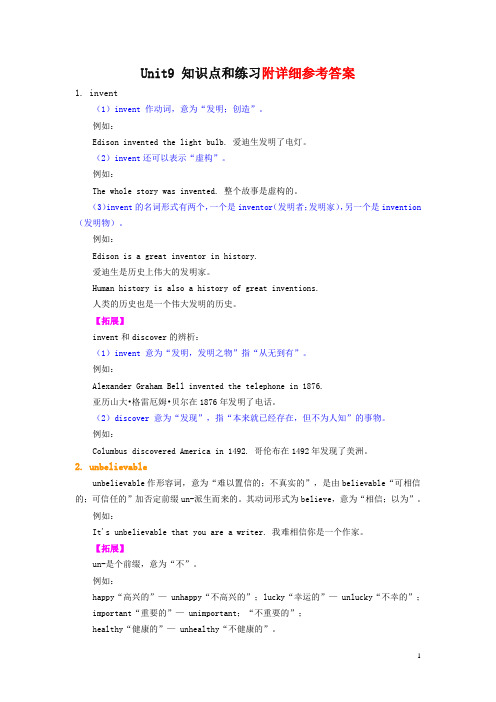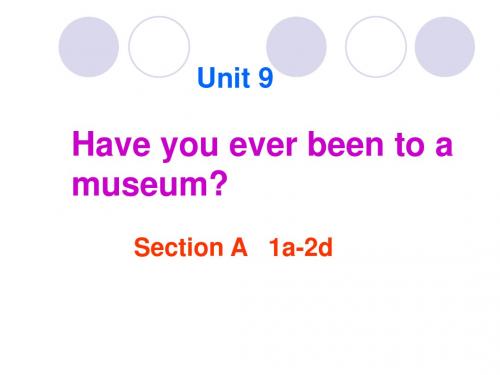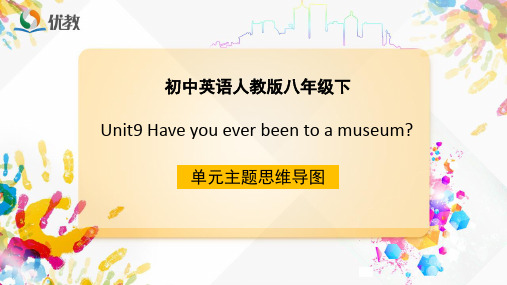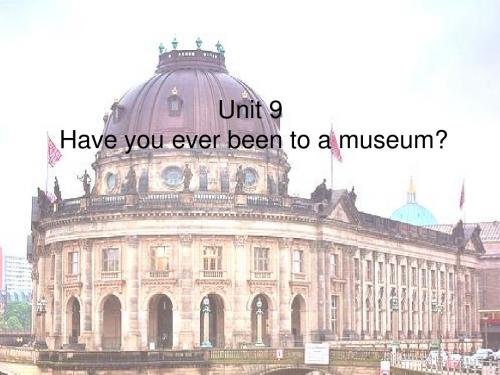人教版八年级英语下册导学案 Unit 9 Have you ever been to a museum(Section A 3a4c)
人教版新目标英语八年级下册:Unit 9《Have you ever been to museum》 讲解+练习题目+答案

Unit9 知识点和练习附详细参考答案1. invent(1)invent 作动词,意为“发明;创造”。
例如:Edison invented the light bulb. 爱迪生发明了电灯。
(2)invent还可以表示“虚构”。
例如:The whole story was invented. 整个故事是虚构的。
(3)invent的名词形式有两个,一个是inventor(发明者;发明家),另一个是invention (发明物)。
例如:Edison is a great inventor in history.爱迪生是历史上伟大的发明家。
Human history is also a history of great inventions.人类的历史也是一个伟大发明的历史。
【拓展】invent和discover的辨析:(1)invent 意为“发明,发明之物”指“从无到有”。
例如:Alexander Graham Bell invented the telephone in 1876.亚历山大•格雷厄姆•贝尔在1876年发明了电话。
(2)discover 意为“发现”,指“本来就已经存在,但不为人知”的事物。
例如:Columbus discovered America in 1492. 哥伦布在1492年发现了美洲。
2. unbelievableunbelievable作形容词,意为“难以置信的;不真实的”,是由believable“可相信的;可信任的”加否定前缀un-派生而来的。
其动词形式为believe,意为“相信;以为”。
例如:It's unbelievable that you are a writer. 我难相信你是一个作家。
【拓展】un-是个前缀,意为“不”。
例如:happy“高兴的”— unhappy“不高兴的”;lucky“幸运的”— unlucky“不幸的”;important“重要的”— unimportant;“不重要的”;healthy“健康的”— unhealthy“不健康的”。
人教新目标英语八年级下册讲义—Unit 9 Have you ever been to a ……

新目标八年级下册Unit 9 Have you ever been to a museum ?讲义一、重点单词1. amusement n. 娱乐; 游戏2. somewhere adv. 在某处; 到某处3. camera n. 照相机; 摄影机; 摄像机4. invention n. 发明物5. invent v. 发明; 创造1. unbelievable adj. 难以置信的; 不真实的2. progress n. 进步; 进展3. rapid adj. 迅速的; 快速的4. unusual adj. 特别的; 不寻常的5. toilet n. 坐便器; 厕所6. encourage v. 鼓励7. social adj. 社会的8. peaceful adj. 和平的; 安宁的9. performance n. 表演; 演出10. perfect adj. 完美的; 完全的11. itself pron.(it的反身代词) 它自己12. collect v. 收集; 采集13. German adj. 德国的; 德语的; 德国人的n. 德语; 德国人14. theme n. 主题15. ride n. 供乘骑的游乐设施; 短途旅程16. province n. 省份17. simply adv. 仅仅; 只; 不过18. fear v. & n. 害怕; 惧怕19. whether conj. 不管......;还是); 或者......(或者); 是否20. Indian adj.印度的 n. 印度人21. Japanese adj.;日本的; 日本人的; 日语的n. 日本人; 日语22. equator n. 赤道23. whenever conj. 在任何......时候; 无论何时24. spring n. 春天25. mostly adv. 主要地; 通常26. location n. 地点; 位置二、短语归纳1.at night在夜晚2.in a more natural environment在一个更加自然的环境中3.all year round 全年4.be far from 离……远5.in the dark 在黑暗中6.in the past 在过去7.have been to sp. 去过某地8.science museum 科学博物馆9.history museum 历史博物馆10.amusement park 游乐园11.go somewhere different 去不同的地方12.go skating 去滑冰13.take the subway 坐地铁14.a great way to spend a Saturday afternoon一个过周六下午的好方法15.all the old movie cameras所有的古老的电影摄影机16.learn about sth.解有关……的情况17.on the weekend 在周末18.camp in the mountains 在大山里露营19.put up a tent搭帐篷20.in such a rapid way 以如此迅猛的方式21.different kinds of各种各样的22.development of toilets 厕所的发展23.social groups 社会团体24.the tea art performances茶艺表演25.make a perfect cup of tea with beautiful tea sets用漂亮的茶具沏一杯完美的茶26.a nice place to enjoy tea 一个品茶的好地方27.thousands of 数以千计的28.International Museum of Toilets国际厕所博物馆29.the Terracotta Army 兵马俑30.Southeast Asia东南亚31.Night Safari 夜间动物园32.three quarters 四分之三33.an English-speaking country一个讲英语的国家34.have problem doing sth. 做某事很困难35.during the daytime在白天36.a couple of times 好几次37.right now 现在;目前38.an amusement park with a special theme一个有特别的主题的游乐园39.walk around the park 在公园里到处走40.hear of 听说41.take a ride兜风42.another province另一个省43.the Bird’s Nest鸟巢44.encourage sb. to do sth.鼓励某人做某事45.on the one hand... on the other hand.一方面,另一方面三、句型集萃1.a great way to do sth一个做某事的好办法2.It’s unbelievable that很难相信……3.watch sb do sth.看某人做了某事4.encourage sb to do sth鼓励某人做某事5.as..as和。
人教版八下 unit_9_Have_you_ever_been_to_a_museum.SectionA

amusement park
water park
bookshop
A: Have you ever been to a…? B: Yes, I’ve been to a... A: A: I’ve Me, also too. been to a...
A: Have you ever been to ...? B: No, I’ve never been to … A: Me I’veneither. never been to ...
Conversation 2 Linda has been to the amusement park. T / F Linda went to the amusement park yesterday . T / F Linda is going to the amusement park again by bike. T / F
Make up a conversation:
Has Dick /Lucy ever been to …? Yes, he /she has. / No, he / she hasn’t. Me too. /Me, neither.
1a Which of these places would you like to visit? Rank them from 1 to 5.
你曾经去过…吗?
A: Have you ever been to a beach? B: Yes, I have.
the Great Wall
A: Have you ever been to …? B: No, I haven’t.
zoo
A: Have you ever been to a zoo? B: Yes, I’ve been to a zoo.
Unit9Haveyoueverbeentoamuseum_SectionA1a-2c课件人教版英语

Free talk Have you ever been to a/an_...? Yes, I have. /No, I haven’t.
have been to (去过),可 以与never[从没], ever [曾经], just[刚刚], once [一次], before[之前]连接。
ahsnmsciapsiawetutaruonscatrrecetmeymemrmzumeopusnuuoeastsuserepeumkuuammrmk
“我也是”结构: So+助动词/情态动词/be+主语(肯定) “So+助动词/be动词/情态动词+主语I.”=Me,too.
Drills --I have ever been to _a_s_c_i_en__ce__m__u_se_u_m___.
Have you ever been there?
回答1:Yes, __I_h_a_v_e___.
➢ 拓展:表示后者与前者情形相同,即“……也不……”时, 常用Me neither.或neither/nor引起的倒装句: Neither/Nor+助动词/系动词be/情态动词+主语.
时态上与前文保持一致,数要与其后的主语一致。
例:—I have never been to a water park.
Look at the map of the town. Listen and circle the places you hear.
2b Listen again and circle T for true or F for false.
Conversation 1
1. Tina went to the space museum last year. T/F
人教版八下Unit9 单元主题思维导图(PPT原创精品)

Fun places
Talk about past experiences
post office, police station, hotel, restaurant, bank, hospital, street, pay phone, park, town, neighborhood .
Places to visit
Jill went there back in April. Jill loves all the old movie cameras. He _l_ea_r_n_e_d_a_b_o_u_t the inventions that _le_d_t_o_color movies, too. He _c_a_m_p_e_d_ in the mountains with some friends on the weekend. They _p_u_t_u_p__ a tent and _c_o_o_ke_d__ outside.
初中英语人教版八年级下
Unit9 Have you ever been to a museum?
单元主题思维导图
Section A 2d
Anna Jill
She _w__e_n_t_t_o_ the film museum last weekend. It’s really interesting. It’s__a_g_r_e_a_t_w_a_y_t_o__ spend a Saturday afternoon. She has never been camping.
现在完成时和一般 过去时的区别
语法篇-现在完成时和一般过去时的区别
同时考虑过去和现在,强调过去的动 现在完成时 作对现在造成了影响或产生了结果
初中英语人教版八年级下册Unit9 Have you ever been to a

space museum ___ history museum___ art museum ___ water park_____ zoo_____ amusement park___
Talk something about the picture.
Claudia Sarah
Listening 1 Choose the best answer. v
Pre-listening speaking
A: Have you ever been to …? B: Yes, I have./ No, I haven’t.
Which of these places would you like 1a to visit? Rank them from 1 (most) to 6 (least).
and circle the places you hear.
2b.Listen again and circle T for true or F for false.
2b
2b
2c. Look at the map in 2a and make conversations about the places.
1. When did Sarah visit the National Science Museum? C A. Today B. Yesterday C. Last year 2. When did Claudia visit the nature museum? A. Last year B. Last summer C C. Last school trip 3. What may the relationship between the two speakers? A. Friends B. Teachers and students A C. Mother and kid
人教版新目标八年级英语下册Unit-9-导学案
课题:Unit 9 Have you ever been to a museum?主备人:审核人:复核人:课型:New 总第1课时【教学目标】Talk about past experiences【重点、难点】have been to; have gone to【教学过程】二次备课预习指导:I. 找出课文中的词组1.太空博物馆_____________________2.历史博物馆_____________________3.艺术博物馆__________________4.游乐园_________________________5.水上乐园____________________6.自然博物馆_______________________7.去个不同的地方________________________ 8.去过___________________9.乘坐地铁_______________________ 10.撑起帐篷_______________________11.度过周六下午的好方式____________________________________________13.在山里野营_________________________________II. 看P111,预习have been 和have gone 的区别,并完成句子1.他去了美国。
_______________________________________________2.他去过美国。
_______________________________________________当堂训练:I. 单项选择( ) 1. ---Where is your father, Tom? --- He_______ to Changsha.A. goesB. has beenC. has goneD. went( ) 2. ---Have you ever been to Shanghai?---Yes, I_______ there a months ago.A. have beenB. wentC. have goneD. will go( ) 3. I________ to Hainan twice. It’s beautiful.A. will goB. have goneC. have beenD. went( ) 4. ---You haven’t been to the West Lake, have you?---_________.But I will go there with my parents this summer vacation.A. No, I haven’tB. No, I didn’tC. Yes, I haveD. Yes, I did ( ) 5. ---How do you go to school every day, by bike or by bus?--- ________ .I go to school on foot.A. BothB. EitherC. NoneD. Neither.( ) 6. Please be quiet. I have _______ to tell you.A. important anythingB. important somethingC. something importantD. anything important( ) 7. They gave away _________ books to our school last year.A. thousand ofB. two thousandsC. thousands ofD. two thousands of ( ) 8. His being late for school _______ a bad result—his teacher was very 二次备课angry.A. lead toB. led toC. led inD. came intoII. 完成下列句子1. I have been to Dalian. (变为否定句)______________________________________________________________2. He has gone to the shop. (改为一般疑问句并做肯定回答和否定回答)______________________________________________________________3. Mary enjoyed herself at the Water World. (改为同义句)______________________________________________________________4. He didn’t go to the park. I didn’t go there, either. (改为同义句)He didn’t go to the park._______ _________ ___________.5.它很有趣,不是吗?It’s really interesting, _______ ___________?6.他上个星期去了青岛,不是吗?He went to Qingdao, _________ _________?7.我的哥哥去过英国,不是吗?My brother has been to England, __________ ____________?III. 读课文,回答下列问题1. Where did Anna go last weekend?______________________________________________________________2. Did Jill go there in April? ________________________________________3. What did Jill do on the weekend?______________________________________________________________4. Has Anna ever been camping? ____________________________________达标检测:翻译下列句子:1.让我们今天去不同的地方。
人教版英语八下U9Have you ever been to a museum 讲义
Unit9 Have you ever been to a museum?一、重点词汇及拓展1. amusement n. 娱乐;游戏e.g. The old ladies played the games just for amusement.老太太们玩这个游戏只是为了取乐。
amuse v. 消遣,逗笑;使开心,使愉快amusing adj. 有趣的,好玩的,好笑的amused adj. 被逗乐的;感到好笑的2.amusement park 游乐场e.g. The amusement park is open from May through October.游乐园从五月到十月开放。
3.somewhere adv. 在何处;到某处pron. 某个地方e.g. Maybe the keys are somewhere in the dining room.也许钥匙在餐厅某个地方。
I need to find somewhere to stay tonight.我得找到今晚要住的地方。
4.camera n.照相机;摄影机;摄像机e.g. I heard your parents bought you a cameras as a gift.我听说你的父母亲给你买了一台照相机作为礼物。
5.invention n.发明;发明物e.g. Do you think mobile phone is a great invention?你认为手机是一个伟大的发明吗?6.invent v.发明;创造inventor n.发明家invention n.发明;发明物e.g. As we all know that Edison invented light bulb.我们都知道爱迪生发明了灯泡。
7. unbelievable adj. 难以置信的;不真实的unbelievably adv. 难以置信地;不真实地unbelievably bad/good 坏得/好得令人难以置信incredible adj. 难以置信的e.g. I still find this story both fascinating and unbelievable.我仍然觉得这个故事非常有趣和难以置信。
2020年春人教新目标英语八年级下册Unit 9 Have you ever been to a
上课时间:年月日蹲点领导签字:备课组长签字:班级:小组:姓名:
Unit9Have you ever been to a museum?SectionA (1a-2d)听说课第1课时主备:复备:
学习目标:
1.我能掌握本课时的6个单词,短语和句子。
2.我能谈论过去的经历,体验现在完成时态的运用。
A. went; had gone B. had gone; has been
C. went; has been D. has been; had gone
( ) 3. Mr Smith doesn't like to go ____ .He'd like to go the amusement park. A. somewhere boring B.boring somewhere
---Of course.I _____ it last weekend.
A. never; saw B. ever; have seen
C. never; have seen D. ever; saw
( )2.Julie's father ____ to London last month. He ____there three times.
2).完成课本1a,先用1a中的地点和对子口头练习对话,然后在小组展示对话。
3)。仿写对话:
A:
B:
Step 3Listening practice( 独学,互学,群学 )
1.听磁带完成课本1b.小组讨论交流答案。对子练习读对话。
2.听磁带,完成课本2a,2b.小组讨论交流答案。对子练习对话,完成课本2c.
3.仿写,利用课本2a的信息编写一段对话。
A:
人教版 八年级英语 下册 Unit_9_Have_you_ever_been_to_a_museum
dish.
Tapescripts:
Boy 1: So, Peter, how long have you been in China? Peter: I’ve been here for two weeks, but I’m going back to Australia tomorrow. Boy 1: Have you traveled much? Peter: Yes, I have. I’ve seen many interesting things. Boy 1: Have you visited the Palace Museum? Peter: Yes, I have. I went there last week. It was wonderful. There were so many beautiful treasures. Boy 1: And have you been to the Great Wall?
1st listening
1b
Listen to a student interviewing a foreign student. Check (√) the questions you hear.
___√_ Have you visited the Palace Museum?
___√_ Have you been to the Great Wall?
- 1、下载文档前请自行甄别文档内容的完整性,平台不提供额外的编辑、内容补充、找答案等附加服务。
- 2、"仅部分预览"的文档,不可在线预览部分如存在完整性等问题,可反馈申请退款(可完整预览的文档不适用该条件!)。
- 3、如文档侵犯您的权益,请联系客服反馈,我们会尽快为您处理(人工客服工作时间:9:00-18:30)。
Unit 9 Have you ever been to a museum 学习目标: 1.学会本课的基本词汇unbelievable, progress, rapid, unusual, toilet, encourage, social, peaceful, performance, perfect, itself, collect及目标语言1) I wonder how much more computer will be able to do in the future2) Watching them prepare the tea with the beautiful tea sets is just as enjoyable as drinking the tea itself 2.锻炼阅读能力。 3.帮助学生了解何种博物馆的知识。 4.学习策略:采用任务型教学模式,把主要学习任务布置给学生,明确任务后,教师提供相关的语言,帮助学生在完成任务的过程中形成主动学习的习惯。通过句型操练、听力训练,培养学生实际应用英语的能力。 激情激趣 导入目标 独立思考 个体探究 分享交流 合作探究 展示提升 启发探究 随堂笔记
导学引航 目的、方法、时间 独学指导 内容、学法、时间 互动策略 内容、形式、时间 展示方案
内容、方式、时间
重点摘记
成果记录 规律总结
Pre-reading Brainstorm: think of the kinds of museums that you can name.
Watch a video. A
video about the International Museum of Toilets Talk about the video.
While-reading 随堂笔记二 Step 1 Greetings and Revision Look at the pictures and make conversation: A: Have you ever been to…? B: Yes, I have./ No, I haven’t. Step 2 Fast reading Match the words with its meaning and learn some new words. True or False ( ) 1. American Computer Museum only has information about different computers there. ( ) 2. Ken thinks computers will do more work in the future. ( ) 3. International Museum of Toilets is a very unusual museum. ( ) 4. India has the most advanced toilet. ( ) 5. Linlin didn’t know why her grandpa loved drinking and collecting tea set. Step 3 Detailed reading Read the passage again and answer the questions. Which three museums do the students talk about? What does Ken say about the American Computer Museum? 3. What can we learn at the International Museum of Toilets? 4. Why is the Hangzhou National Tea Museum a nice place to enjoy tea? 5. What do you think is the most interesting thing about each museum?
对学 检查对子独学情况(随堂笔记一、二)
群学 1.组内互听互查朗读课文,纠正发音,做好展示朗读的准备。 2.组内交流、讨论独学随堂笔记一、二,做好展示观点的准备
预展: 针对展示方案, 组内积极思考,全员参与展示设计展示方式。
方案一:文章共欣赏 展示朗读课文。
方案二:文段共赏析 1.回顾文章,找出每段的中心句。训练学生整体把握文章的能力。 学生在阅读的同时注意现在完成时的用法。
方案三:句子共解析 解读对文中重点句子的理解。
随堂笔记一: A.翻译下列词汇: 进步;进展 ____ 发明v.__________ 坐便器;厕所____ 鼓励___________ 茶艺 ___________茶具____________ 收集;采集_______它自己______
完美的;完全的 ___和平的;安宁的____ 社会的 ______迅速的;快速的___ B.根据首字母填空. 1. She has a __________ finished her homework. 2. ----Mickey Mouse and Donald Duck are the famous Disneyland c_______. 3. Disneyland is an amusement park, but we can also call it a t________ park.
我的收获: __________________________________________________________________________________________________________________________________________________________________
当堂测评 分层达标 基础落实★ 单项选择 ( )1.My mother often encourages me________English as much as possible. A. speak B. speaks C. speaking D. to speak ( )2.—Do you often ___ your pen friend? --Not very often. A. hear from B. hear about C. hear of D. hear ( )3.Neither of the two boys______from the USA. A.come B. don’t come C.comes D.doesn’t come ( )4.Have you ever seen him____? A. ago B.two days ago C.before D.just now ( )5.His brother ______ for three months. A. has joined the army B.has been in the army C. has become a soldier D.joined the army ( )6.Did you go there by ____bike? A. a; a B./; a C.the; the D.a; the ( )7.There has never been such a beautiful village ____in the world. A. anywhere B. everywhere C. somewhere D. nowhere ( )8.-What kind of house would you like ? -I’d like ____with a garden in front of____. A. it; one B. one; one C one; it D. it ; it ( )7.She has never been to the city , ____she? A. doesn’t B. hasn’t C. has D.haven’t ( )8. –It’s Father’s Day, ____ ? -Yes,Let’s buy a gift for Dad.. A. isn’t it B. dosen’t it C isn’t he D.doesn’t he ( )9.Juile’s father____to London last month.He____there three times. A. went; had gone B. has gone; has been C went; has been D. has been; had gone ( ) 10. I don’t like those two coats because ________ of them fits me. A. either B. neither C. none D. all ( ) 11. ––I really want to go to the . How about you? –– So do I. We can swim in it. A. water park B. aquarium C. zoo D. space museum ( ) 12. ____ is fun to learn another language. A. That B. This C. It D. What ( )13. ––I hear your teacher ________ to Japan once. ––Yes, he _______ there last year. A. goes; went B. has been; has been C. went; went D. has been; went ( ) 14. –– _______ have you been studying English? –– Since last year. A. How far B. How soon C. How long D. How often
( ) 15. The Smiths have lived here with us ________ 1999.
